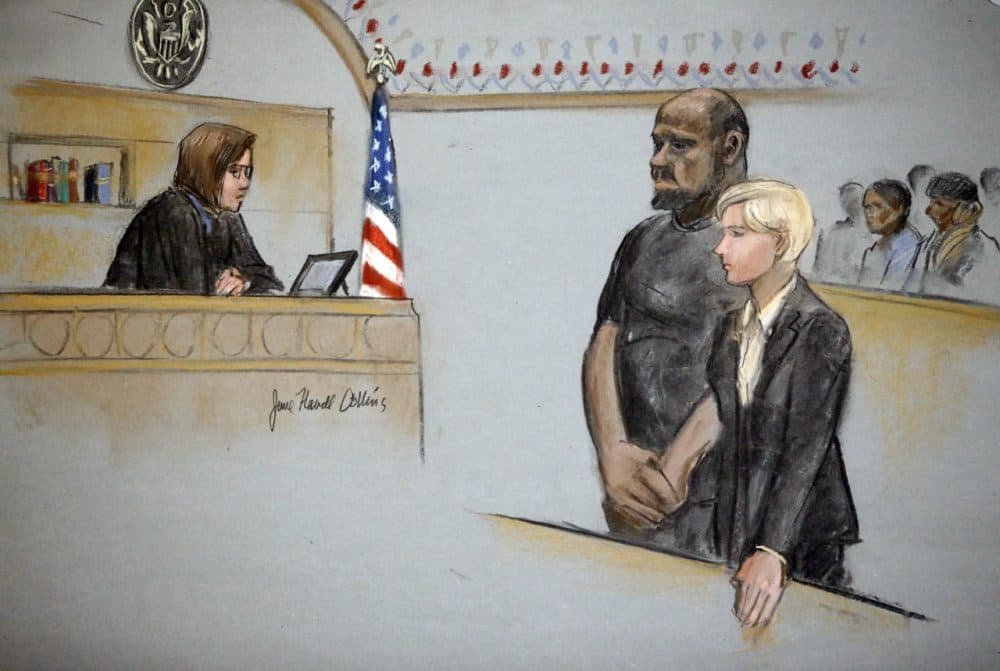Advertisement
Everett Man Found Guilty On All Charges In ISIS Terrorist Plot

The message came in swiftly: A verdict had been reached. And the speed with which it came was seen as bad news by the defense.
Leaning in to confer with the towering defendant, lawyer Jessica Hedges put a hand on David Wright's back to prepare him. His mother and grandmother, who had attended the trial daily, were noticeably absent from the federal courtroom.
When the jurors filed in, they looked the other way.
They had reached five verdicts in six hours, and they left acting U.S. Attorney William Weinreb to do the talking.
"Mr. Wright is a terrorist, an ISIS supporter and recruiter who intended to wage war against the United States by beheading people and killing Americans," he said.
The jury found Wright, an Everett man, on all counts guilty of conspiracy to provide material support to a foreign terrorist organization and to commit acts of terror across national boundaries.
Wright, who had testified he didn't mean any of it, had certainly written with bravado.
“Oh America, your days are numbered," he had written in an online manifesto in May 2015. "We have begun planning and working, and there is no forewarning that can prepare you for this reality."
He didn't really mean that either, Wright had testified. He also said he didn't really believe any of the other stuff the Joint Terrorist Task Force had found in tweets, Facebook entries, downloads, texts and telephone calls they listened in on — or the stuff law enforcement collected from a confidential informant they assigned to befriend Wright.
As Peter Kowenhoven, the FBI's special assistant agent in charge in Boston, sees it, the jury gave America a victory in the war on terror. He said Wright is indicative of the threat the country faces of "individuals in their own homes ingesting a steady diet of terrorist training propaganda and information leading to radicalization."
Advertisement
Wright described himself as a 530-pound couch potato living his days out through violent video games and engaging in a fantasy world to fill an empty life with ISIS role-playing to win attention.
"My client was an idiot," his attorney had said, but, the defense insisted, he never intended to hurt anyone.
The prosecution called it a ridiculous story.
"Wright and his uncle planned to murder Americans and those plans were as real as the long knives that Wright's uncle bought to carry them out," said Weinreb.
The most serious charge Wright was found guilty of was of conspiring to commit acts of terror "transcending national boundaries." It could mean life in prison. The government had presented evidence that a top ISIS operative in Syria contacted Wright's uncle, Usaamah Rahim, with information to find and behead Pam Geller, a conservative blogger described in 2015 by the Southern Poverty Law Center, which tracks extremist groups, as "the anti-Muslim movement's most visible and flamboyant figurehead."
In contrast to the violent and disciplined threat of ISIS fighters, Wright and his associate, Nicholas Rovinski, a Warwick, Rhode Island, man in his 20s, seem like an unlikely pair of terrorists. A 530-pound man and a slight man with cerebral palsy who had the conceit that he could swim out to and commandeer a Navy battleship. Rovinski pleaded guilty to conspiracy charges, including the plot to behead Geller, in September of 2016.
"I look at David Wright as well as the two associates," said FBI agent Kowenhoven. "Though you may not think they have that capability, look at what happened on June 2."
He was talking about June 2, 2015. That was when Wright's uncle told Wright on recorded phone call that he wanted to "go after" "some boys in blue." Rahim said it on a phone call with Wright — a call played for jurors — in which Wright encourages his uncle to go ahead, but not before wiping the computer and destroying the telephone to get rid of the evidence.
That was no fantasy, the prosecution asserted.
In a statement to WBUR, Wright's lawyer expressed disappointment with the verdicts. "We are ... especially heartbroken for David and his family. But we, along with David, honor the process. We are not finished."
Sentencing comes in December.
This segment aired on October 19, 2017.
